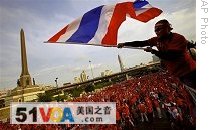Bangkok
09 April 2009
Political tensions in Thailand have risen sharply after supporters of former Prime Minister Thaksin Shinawatra stepped up protests in the Thai capital and shut down key roads. The protesters threaten more drastic action if the government does not resign.
 |
| Anti-government protesters and supporters of exiled Prime Minister Thaksin Shinawatra fill up the Victory monument intersection during a protest in Bangkok, 9 April 2009 |
Protesters demand PM's resignation
The pro-Thaksin forces, mostly wearing red, demanded that Prime Minister Abhisit Vejjajiva resign.
Mr. Abhisit, who leads the Democrat Party in a coalition government, rejects that demand.
A protester at one blockade, speaking through a translator expresses concern for tourist and others inconvenienced.
"Sorry for the [inconvenience] at the moment," the protester said. "We only want the government to heed to our demands. I think this will not take a long time."
Buranaj Smutharak, a Democrat Party spokesman, says the protests could proceed if they remain lawful and peaceful. But he says the government is considering steps to prevent violence.
"Instances where there are clear attempts either to destroy public or private property or create civil unrest then they will be dealt with according to the letter of law. But at the same time, the government is exploring avenues to sit down and negotiate," Buranaj said.
Thaksin frequently addresses protesters
The rallies began in March, and Mr. Thaksin, who fled Thailand last year in the face of corruption charges, has addressed protestors frequently by video link. He was ousted in a coup in 2006.
The protests follow months of similar demonstrations by anti-Thaksin forces last year. Those protesters, clad in yellow, took over a government building and seized Bangkok's airports before court rulings ousted a government linked to Mr. Thaksin.
Demonstrations could spark violence
Chris Baker, an author and commentator on Thai politics, says that if the pro-Thaksin forces escalate their demonstrations, it could spark violence, leading the military to intervene in politics.
"The army has clearly taken a very different attitude to the Red Shirts demonstrations than it has to the Yellow," Baker said. "It has said from the beginning it will not tolerate these demonstrations in the same way [as last year's]. So there has to be a breaking point."
Thailand has become increasingly divided since Mr. Thaksin first came to power in 2001, with the support of the urban and rural poor. The country's urban middle class, however, opposed him, accusing him of being corrupt and authoritarian.
The pro-Thaksin groups have threatened to take their protest to this weekend's Association of Southeast Asian Nations summit at a seaside resort near Bangkok. The government says the meeting will go ahead, despite a threat by the protesters to disrupt it.
In addition to the 10 members of ASEAN, government heads from Australia, China, India, Japan, New Zealand and South Korea are expected to attend.